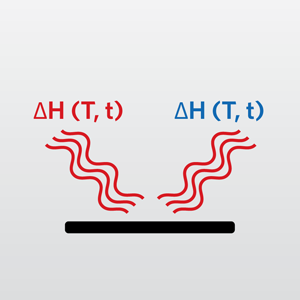Differential Scanning Calorimetry (DSC)
Differential Scanning Calorimetry (DSC) is a powerful thermal analytical tool that performs quantitative calorimetric measurements on solid, liquid or semisolid samples. DSC is typically used to determine AF transformation temperature of nitinol. The DSC measures the quantity of heat that flows into or out of the sample using temperature sensors which are positioned in the heating block of a “heat flux” type DSC. A temperature program is applied to a sample and an inert reference material in the DSC cell and the sensors measure the temperature difference between them. When the sample undergoes a thermal process that evolves heat, such as crystallization, the DSC plot shows an increase in heat flow. This is indicative of an exothermic event because the temperature registered by the sample sensor is higher than that sensed for the reference. If the sample undergoes a thermal event that causes it to absorb more heat than the reference does (such as melting), the DSC plot shows a decrease in heat flow. This is called an endotherm and, in this case, the temperature sensor measures a lower temperature for the sample compared to the reference.

A typical DSC scan involves heating the sample at a controlled steady rate, such as 10°C per minute, and monitoring the heat flow to characterize the phase transitions and/or cure reactions as a function of increasing temperature. More involved studies utilize multiple heating and/or cooling ramps, as well as isothermal hold segments. EAG Laboratories also offers a temperature modulation technique (Modulated DSC), which is capable of measuring weak transitions and separating overlapping thermal events.
EAG Laboratories also features some DSC instruments that measure absolute heat flow because correction factors for cell resistance and capacitance have been applied. These instruments can output a heat capacity signal directly in a single experiment by dividing the absolute heat flow by the measured heating rate. Monitoring the heat-capacity signal as a function of the applied experimental conditions (such as a heating ramp) can determine how the heat capacity of the sample changes as it undergoes a phase change or a chemical reaction. Direct heat capacity measurements can also be obtained at isothermal temperatures with a high level of accuracy.
Ideal Uses of Differential Scanning Calorimetry (DSC)
- Characterizing relevant phase transitions (e.g. melting, crystallization, Tg), which can be used to determine the best processing temperatures and maximum use temperatures
- Measuring heat capacity of pure compounds and mixtures
- Measuring heat of fusion and heat of solidification (delta H – enthalpy change)
- Comparing quality (QC, failure analysis, new material evaluation)
- Identifying unknown materials, and determining the presence of impurities
- Evaluating formulations, blends and effects of additives
- Determining the effects of aging
- Estimating percent crystallinity
- Determining percent purity of relatively pure organics
- Analyzing cure or crystallization kinetics
- Determining phase separation of polymer blends and copolymers
- Estimating the degree of cure; measuring residual cure
- Evaluation of eutectic point and construction of phase diagrams
- Characterizing polymorphic materials
- Evaluating thermal history of compounds
- Performing sensitive measurements of subtle, weak or overlapping phase transitions
- Characterization of medical device polymer materials, such as polyurethane foams.
Strengths
- Small sample size
- Highly accurate measurement of phase transitions and heat capacities
- Very precise temperature control
- Sensitive measurement of subtle or weak phase transitions
- Ability to separate overlapping thermal transitions (Modulated DSC option)
Limitations
- Destructive
- No direct elemental information
- Works best for samples having a surface that spreads relatively flat against the bottom of the “crucible” or pan
- Accurate data cannot be obtained when a decomposition or reaction event occurs within the same temperature region as the phase transition (e.g. melting)
- Mass of sample has to remain constant in the pan for accurate measurement; that means no loss of sample to evaporation or sublimation during the test
DSC Technical Specifications
- Temperature range: -180°C – 725°C
- Controlled heating rates: 0.01 to 200 °C/minute
- Temperature accuracy: +/- 0.1°C
- Temperature precision: +/- 0.01°C
Would you like to learn more about using Differential Scanning Calorimetry (DSC)?
Contact us today for your Differential Scanning Calorimetry (DSC) needs. Please complete the form below to have an EAG expert contact you.